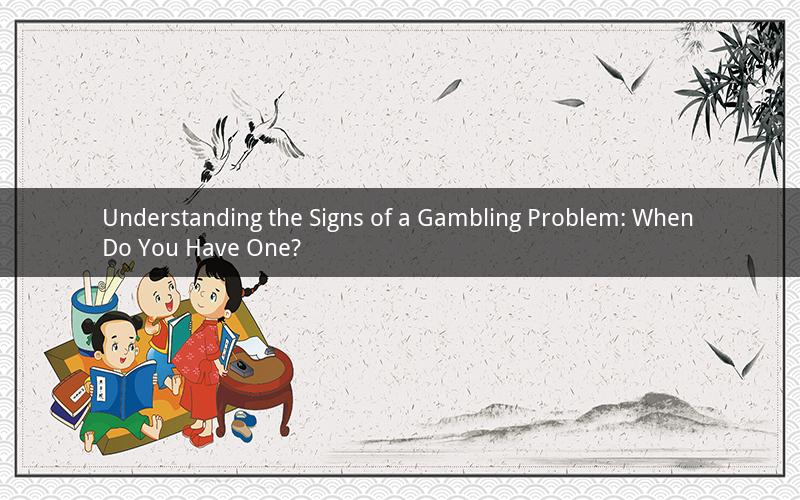
Gambling has long been a popular form of entertainment, but for some individuals, it can quickly spiral into a serious problem. Identifying the signs of a gambling problem is crucial for taking the necessary steps to address it. In this article, we will explore the common indicators of a gambling problem and provide guidance on when you might have one.
1. Financial Concerns
One of the most apparent signs of a gambling problem is financial strain. If you find yourself constantly worrying about money due to gambling, it may be time to evaluate your situation. Here are some financial indicators to consider:
- Owing money to creditors or family members due to gambling debts
- Borrowing money to fund gambling activities
- Selling personal belongings or assets to pay off gambling debts
- Missing payments on bills or loans due to gambling expenses
2. Emotional and Psychological Symptoms
Gambling problems can have a significant impact on your emotional and psychological well-being. Pay attention to the following symptoms:
- Feeling guilty, ashamed, or remorseful after gambling
- Feeling anxious, irritable, or depressed when not gambling
- Developing a strong urge to gamble, often leading to increased tension and stress
- Experiencing mood swings or emotional instability due to gambling
3. Social and Personal Relationships
Your gambling problem may start to affect your relationships with friends, family, and loved ones. Here are some social indicators to consider:
- Isolating yourself from friends and family due to gambling
- Lying to loved ones about your gambling activities
- Missing important events or responsibilities due to gambling
- Experiencing conflict or arguments with loved ones over gambling
4. Legal and Professional Consequences
Gambling problems can also lead to legal and professional consequences. Consider the following indicators:
- Facing legal issues due to gambling, such as theft or fraud
- Losing your job or struggling to maintain your career due to gambling-related issues
- Being suspended or terminated from a professional organization due to gambling-related behavior
5. Physical Health Issues
Gambling problems can also take a toll on your physical health. Pay attention to the following physical indicators:
- Experiencing sleep disturbances or insomnia due to gambling-related stress
- Developing headaches, stomachaches, or other physical symptoms caused by stress
- Engaging in risky behaviors, such as neglecting personal hygiene or skipping meals, to fund gambling activities
When Do You Have a Gambling Problem?
Determining when you have a gambling problem can be challenging, as it often develops gradually. However, if you find yourself experiencing multiple signs and symptoms from the categories mentioned above, it is essential to seek help. Here are some scenarios that might indicate you have a gambling problem:
- You have tried to stop gambling but find it difficult to resist the urge.
- You have spent more time and money on gambling than you intended.
- You have jeopardized or lost significant relationships due to gambling.
- You have turned to illegal activities, such as theft or fraud, to fund your gambling habits.
It is important to note that not everyone who gambles will develop a problem. However, if you are experiencing any of the signs and symptoms mentioned in this article, it is crucial to take action. Seeking help from a professional can provide you with the support and resources necessary to overcome your gambling problem.
Questions and Answers:
1. Q: How can I tell if my gambling is becoming a problem?
A: Look for signs of financial strain, emotional and psychological symptoms, social and personal relationship issues, legal and professional consequences, and physical health issues. If you are experiencing multiple signs, it may be time to seek help.
2. Q: Can I overcome a gambling problem on my own?
A: While some individuals may be able to overcome their gambling problem with self-help strategies, it is often beneficial to seek professional help. A therapist or counselor can provide you with personalized support and coping mechanisms.
3. Q: Are there any treatment options available for gambling problems?
A: Yes, there are various treatment options available, including therapy, support groups, and residential programs. The most effective treatment plan will depend on your individual needs and preferences.
4. Q: Can a gambling problem lead to addiction?
A: Yes, gambling can lead to addiction, similar to other substance-related addictions. If you find yourself unable to control your gambling behavior, it is crucial to seek help to prevent further complications.
5. Q: Is it possible to prevent a gambling problem?
A: Yes, it is possible to prevent a gambling problem by setting limits on your gambling activities, avoiding high-risk gambling environments, and seeking support from friends, family, or professionals if you feel you are at risk. Education and awareness about the potential dangers of gambling can also help prevent problems from developing.